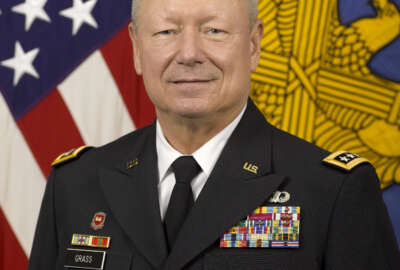
Air National Guard uses crash courses to narrow cyber training backlog
The Air National Guard is putting its troops through two month cyber courses to instill basic cyber skills.
The Air National Guard is preparing to graduate its first class of rapidly trained cyber warriors as the service works to lower its training backlog.
The Air Guard is sending active duty and Guard personnel to an “adaptive” training course in Little Rock, Arkansas to give them basic cyber skills.
From there they are sent to Keesler Air Force Base in Biloxi, Mississippi, “to get the top off of cyber war training and then get them out the door, not in two years but in some cases two months,” said Air National Guard Director Lt. Gen. L. Scott Rice during a Feb. 7 Air Force Association event in Arlington, Virginia. “We are really rapidly getting people based upon their capability and what they came in the door with, out the other end of the door faster and quicker. That’s a pretty innovative thing we are doing down there trying to ‘modulize’ our training and adapt it to individuals.”
The first class of 20 students will graduate next month. Rice told Federal News Radio the Air National Guard hopes to double the amount of students in each two month class. The classes are run every three months.
“We are trying to get up to a capacity of about 100 to 150 for each class. We don’t have enough instructors for that. We will probably max out for the next couple years about 50 a class and then we will get up to our goal. We have the facilities for it,” Rice said.
The National Guard has been struggling to train enough of its cyber warriors. Rice said the limiting factor for the Air National Guard is the training pipeline.
For example, at McConnell Air Force Base in Kansas there is a shortage of cyber trainers for the number of Air National Guard cyber units.
“There is a sufficient number of people that want to fill those slots, but an insufficient number of people who are training those individuals to do so,” Sen. Jerry Moran (R-Kan.) said during a hearing on the National Guard last year. “One of the new cyber squadrons at McConnell has 42 vacancies. I don’t think this is because we can’t find the individuals who want to fill those 42 vacancies. It’s because we only have three of those folks who are in a position to receive the training this fiscal year.”
The National Guard plans to have 30 cyber units that will be stationed in at least 30 states by fiscal 2019.
Then-Chief of the National Guard Bureau Gen. Frank Grass told Congress last March the Guard was trying to accelerate training.
Grass said cyber units go through three types of training, which include basic skills, certifications for working in a cyber range and joint training.
“Our goal for cyber defense is to train, equip and provide highly-skilled forces responsive to the needs of the nation,” Grass said. “Working with the Army and Air Force, our cyber squadrons and teams will provide trained and ready soldiers and airmen to support requirements established by the services and U.S. Cyber Command.”
Rice called the military’s need for cyber troops “insatiable.”
“Each time we define the problem and figure out the solution. We’ve already figured out the demand is bigger than the problem we just solved. Opening the can of worms for one problem we find out five more. The depth of where we are going we haven’t even seen close to a limit of what it means,” Rice said.
Copyright © 2025 Federal News Network. All rights reserved. This website is not intended for users located within the European Economic Area.
Scott Maucione is a defense reporter for Federal News Network and reports on human capital, workforce and the Defense Department at-large.
Follow @smaucioneWFED



